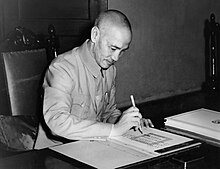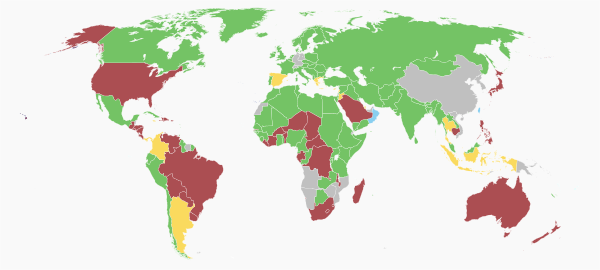China and the United Nations
[5] Amid the Sino-Soviet split and Vietnam War, United States President Richard Nixon entered into negotiations with Chinese Communist Party Chairman Mao Zedong, initially through a secret 1971 trip undertaken by Henry Kissinger to visit Zhou Enlai.
[23] Eleanor Roosevelt, as the driving force behind the Declaration, recalled in her memoirs: Dr. Chang was a pluralist and held forth in charming fashion on the proposition that there is more than one kind of ultimate reality.
On 1 February 1951, after cease fire negotiations failed, United Nations General Assembly passed resolution 498 and called the intervention of the People's Republic of China in Korea an act of aggression.
Critics argue this acceptance rate is misleading due to lobbying efforts, while the U.S. and UK expressed disappointment, and Russia and Gambia praised China's approach.
[32] Publishing in 2024, academic Sun Yi states that China has "played an increasingly dynamic role in energizing" the UN's Intangible Cultural Heritage Cooperation program.
[34]: 30–31 As part of China's view of South-South cooperation, it often seeks to base its UN voting behavior on the positions of regional groupings in the global South like the Arab League or the African Union.
[39] From 1991 to 2020, the vast majority of China's abstentions and all of its vetoes have occurred on issues that involve territorial integrity, primarily sanctions and the jurisdiction of the International Criminal Court.
While the PRC was an ally of the Soviet Union, the United States sought to prevent the Communist bloc from gaining another permanent seat in the Security Council.
[10][11][12] Mongolia's application had been tabled at the UN on 24 June 1946, but had been blocked by Western countries, as part of a protracted Cold War dispute about the admission of new members to the UN.
On 14 December 1955, the Security Council adopted a compromise proposed by the Soviet Union, and the General Assembly, by Resolution 995 (X), admitted sixteen countries into UN, omitting Mongolia and Japan from the list.
[52] The same year, United Nations General Assembly Resolution 1668 made China's representation an "important question" requiring a two-thirds majority vote to alter.
[53] The Nobel Foundation noted that UNHCR, among other contributions, was asked by the UN General Assembly (Resolution 1167[54] and 1784[55]), in 1957 and again in 1962, to assist Chinese refugees in Hong Kong[56][57] whose numbers are estimated at over one million.
On 29 September 1960, Nepali PM BP Koirala proposed UN general assembly to make PRC a member of UN: In our opinion, the United Nations can neither become universal nor can it reflect the political realities existing in the world today until the People's Republic of China is given its rightful place in the organization.
[61]The admission of newly independent developing nations in the 1960s gradually turned the General Assembly from being Western-dominated to being dominated by countries sympathetic to the PRC.
Saudi Arabia submitted a proposition allowing the ROC to retain its seat at the UN and its affiliated organizations "until the people of the Island of Taiwan are enabled by a referendum or a plebiscite" under the auspices of the UN to choose among three options: continued independence as a sovereign state with a neutral status defined by a treaty recorded by the UN; a confederation with the PRC; or a federation with the PRC,[64] but was not supported by the United States.
[65] Seeking to place more diplomatic pressure on the Soviet Union, United States president Richard Nixon sent his national security advisor Henry Kissinger on two trips to the People's Republic of China in July and October 1971 (the first of which was made in secret via Pakistan) to confer with Premier Zhou Enlai, then in charge of Chinese foreign policy.
[66][67][68] His trips paved the way for the groundbreaking 1972 summit between Nixon, Zhou, and CCP Chairman Mao Zedong, as well as the formalization of relations between the two countries, ending 23 years of diplomatic isolation and mutual hostility in favour of a tacit strategic anti-Soviet alliance between China and the United States.
The representative of ROC made a declaration that the rejection of the 22-power draft resolution calling for a two-thirds majority was a flagrant violation of the United Nations Charter which governed the expulsion of Member States and that the delegation of the Republic of China had decided not to take part in any further proceedings of the General Assembly.
[73] In addition to losing its seat in the UN, the UN Secretary-General concluded from the resolution that the General Assembly considered Taiwan to be a province of China, and thus it does not permit the ROC to become a party to treaties for which it is the depository.
[76] While all these proposals were vague, requesting the ROC be allowed to participate in UN activities without specifying any legal mechanism, in 2007 President Chen Shui-bian submitted a formal application under the name "Taiwan" for full membership in the UN.
[81] However, the application was rejected by the United Nations Office of Legal Affairs citing General Assembly Resolution 2758,[82] without being forwarded to the Security Council.
[87] A group of UN member states put forward a draft resolution for that autumn's UN General Assembly calling on the Security Council to consider the application.
[89] Nevertheless, Secretary General Ban Ki-Moon's statement reflected long-standing UN convention to deny the ROC representation and is mirrored in other documents promulgated by the United Nations.
That autumn the ROC took a new approach, with its allies submitting a resolution requesting that the "Republic of China (Taiwan)" be allowed to have "meaningful participation" in the UN specialized agencies.
[76][92] Shortly after this, the United States and the national governments of the European Union expressed their support for "Taiwan" (none of them recognises the ROC) to have "meaningful participation" in UN specialized agencies, such as the World Health Organization.
This was the ROC's first participation in an event organized by a UN-affiliated agency since 1971, as a result of the improved cross-strait relations since Ma Ying-jeou became the President of the Republic of China a year before.
[97]Since Tsai Ing-wen took office in 2016, there are growing number of renewed attempts to join the United Nations in its own right under the name "Taiwan" but this was prevented by the PRC.
Even though China has continued to suppress political dissidents at home, and appears at times resolutely defiant of outside pressure to reform, Ann Kent argues that it has gradually begun to implement some international human rights standards.
[35]: 82 When an enlargement of the Security Council was discussed in 1995, China encouraged African states to demand seats for themselves as a counter-move to Japan's ambitions, and thereby nullified the Japanese initiative.
[111] Initially the OHCHR denied the accusation but then confirmed the sharing of names but refuted that it had resulted in harmful effects on the human rights defenders in question.



